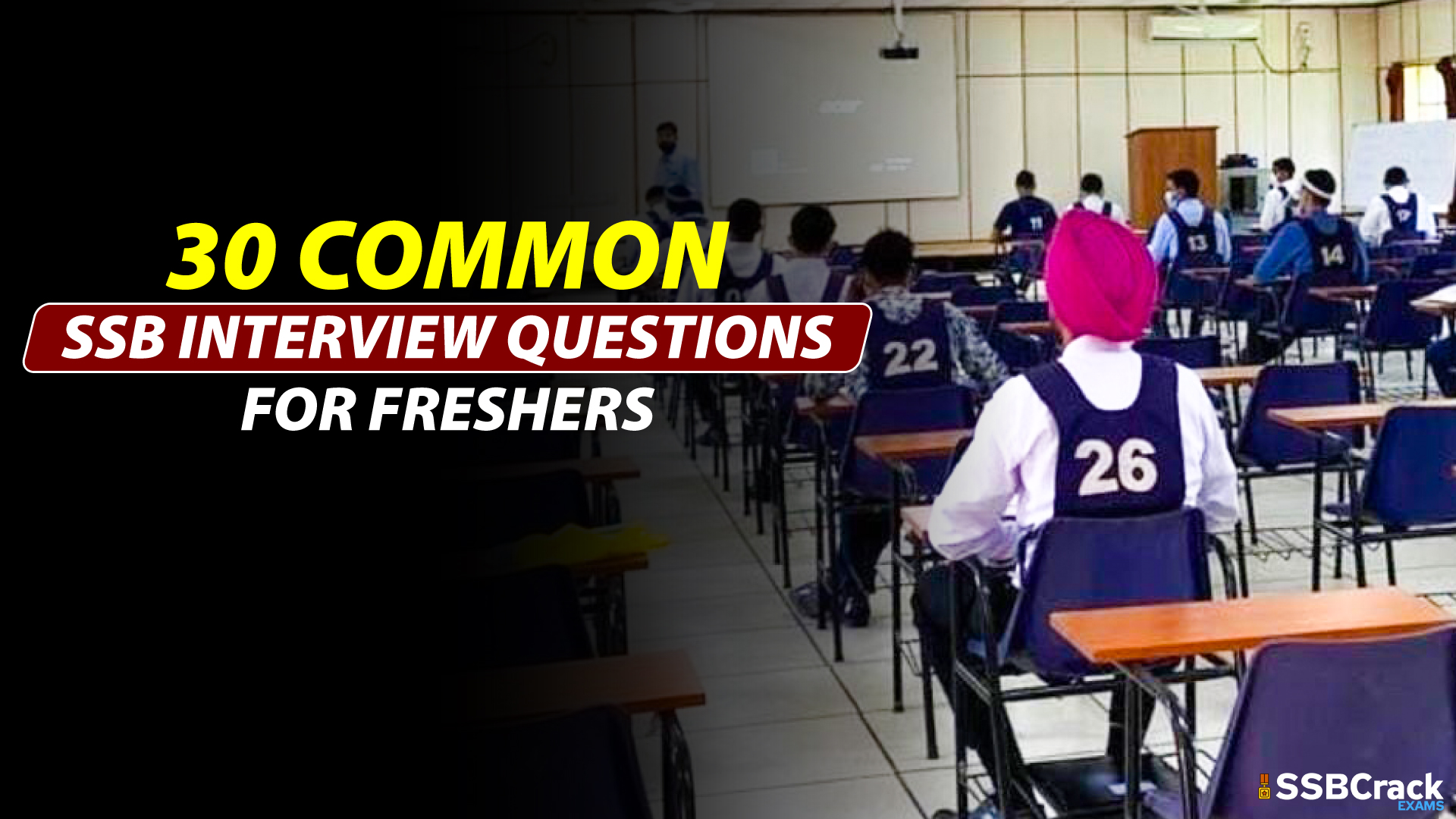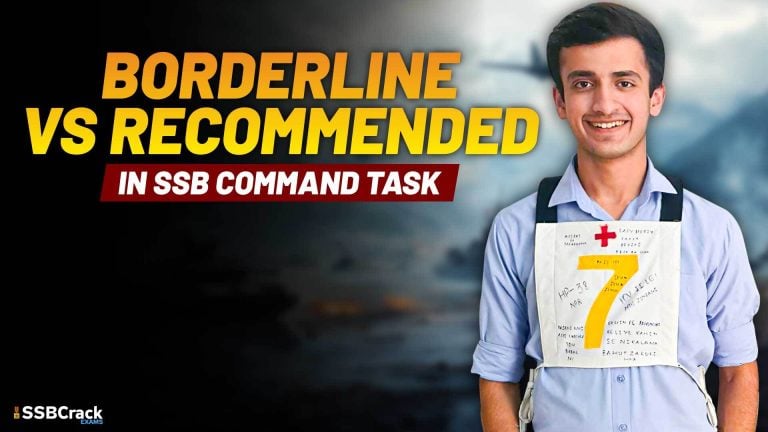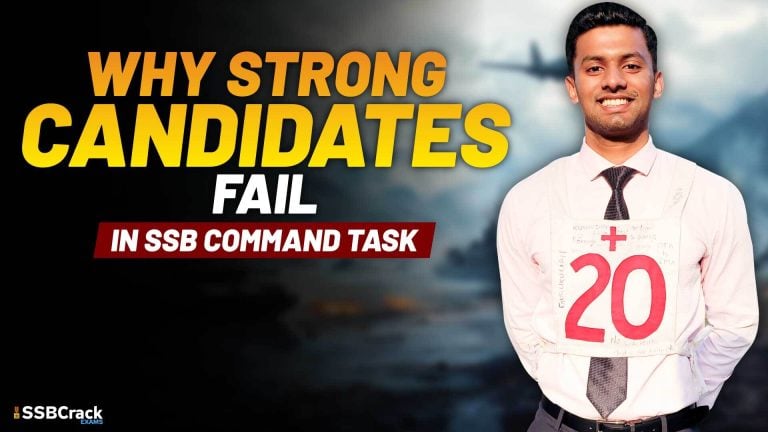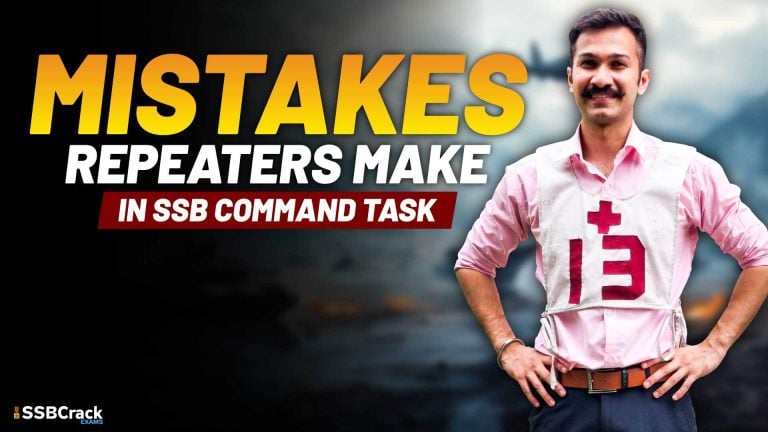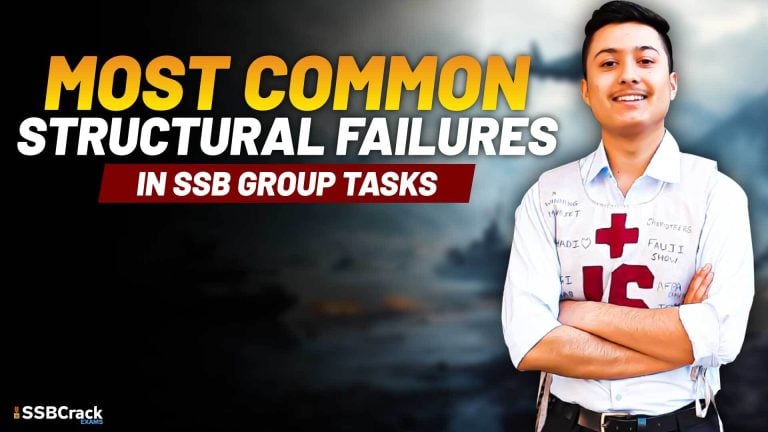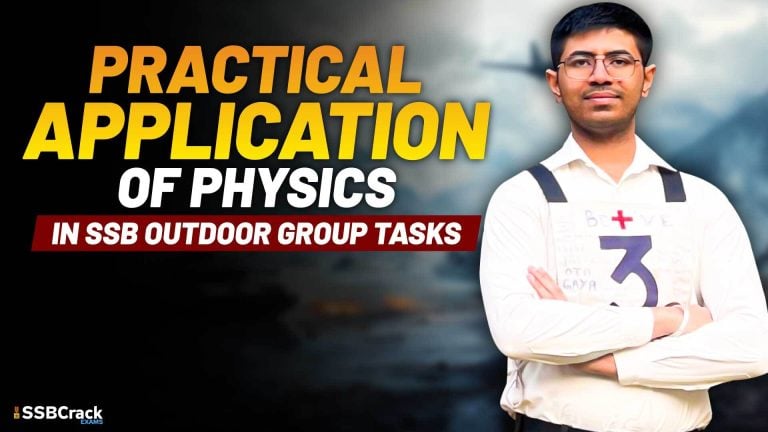The Services Selection Board (SSB) interview is not merely an interview but a comprehensive assessment process that evaluates a candidate’s personality through three dimensions: Mansa (Psychological), Vacha (Interview), and Karma (Ground Testing). The purpose is to identify officer-like qualities in candidates aspiring to join the defence forces.
The key to success lies in authenticity. Candidates are advised to present their genuine selves throughout all tests. However, it’s equally important to develop the necessary officer-like qualities within your personality before showcasing it. While there’s no fixed questionnaire for the interview, certain questions are commonly asked to freshers.
This article presents 30 common SSB interview questions along with guidance on how to approach each one effectively.
Common SSB Interview Questions For Fresher and How to Answer Them
1. Why do you want to join the defence forces?
Approach: This fundamental question assesses your motivation and commitment. Focus on patriotism, family tradition (if applicable), the prestige of serving the nation, your admiration for military discipline and values, and career growth opportunities. Avoid mentioning materialistic benefits as your primary motivation.
Sample Answer: “I’ve always been inspired by the valor and dedication of our armed forces. The opportunity to serve my country while leading a disciplined and purposeful life appeals to me deeply. The defence forces offer not just a career but a way of life that aligns with my personal values of integrity, courage, and selfless service.”
2. Tell me about your schooling, best friends, favorite teachers, subjects you liked, activities you were involved in, subject choices after 10th, and competitive exams attempted.
Approach: This comprehensive question explores your educational background and social adaptability. Be chronological and highlight achievements, leadership roles, and extracurricular activities that demonstrate officer-like qualities.
Sample Answer: “I completed my schooling at Delhi Public School with 85% in my 12th boards. During school, I was actively involved in the NCC and served as house captain. My favorite teacher was Mr. Sharma, my Physics teacher, who inspired analytical thinking. I enjoyed Mathematics and Physics most and chose the Science stream after 10th because of my aptitude for these subjects. I participated in various inter-school debates and sports competitions, especially basketball, where I led our team to district level. I’ve attempted the NDA written exam twice, clearing it once, and also appeared for CDSE.”
3. How do you handle rapid-fire questions?
Approach: Stay calm and composed. These questions are designed to test your presence of mind and coherence under pressure. Remember that the questions often follow a logical connection.
Guidance: Practice rapid response sessions with friends or mentors. Focus on brevity and clarity. If you don’t know an answer, it’s better to say “I don’t know” than to fabricate information.
4. Tell me about your family, siblings, what you like and dislike about your father, with whom you are more friendly, and how you solve problems at home.
Approach: This question evaluates your family dynamics and conflict resolution skills. Be honest about relationships while highlighting positive aspects of family influence on your personality development.
Sample Answer: “I come from a family of four—my parents, my younger sister, and myself. My father is a civil engineer, and I admire his work ethic and problem-solving approach. However, I sometimes find his perfectionism challenging. My mother is a school teacher who has instilled strong values in us. I’m close to both parents but share my personal concerns more openly with my mother. When we face issues at home, we usually discuss them during dinner and find solutions collectively.”
5. What will you do if you do not get selected?
Approach: This tests your resilience and determination. Show that you have alternative plans while maintaining that joining the defence forces remains your primary goal.
Sample Answer: “Selection in the defence forces is my primary goal, and I’m committed to improving myself and attempting again if not selected this time. Meanwhile, I would continue my education in engineering and prepare more rigorously for the next opportunity. Each attempt would help me identify my weaknesses and work on them.”
6. Tell me about your strengths and weaknesses, and what you did to improve them.
Approach: Demonstrate self-awareness and continuous self-improvement. Mention genuine strengths relevant to a military career and weaknesses that you’re actively addressing.
Sample Answer: “My strengths include physical fitness, decision-making abilities, and team leadership—qualities I’ve developed through sports and group activities. My weakness used to be time management, which I’ve improved by maintaining a structured daily schedule and prioritizing tasks. I’m still working on my public speaking skills by regularly participating in debates and group discussions.”
7. What are your hobbies, likes, and dislikes?
Approach: Choose hobbies that reflect positively on officer-like qualities such as leadership, team spirit, physical fitness, or intellectual growth.
Sample Answer: “I enjoy playing basketball as it builds team coordination and physical fitness. Reading military history has been another interest that helps me understand strategic thinking. I also enjoy trekking, which has taught me endurance and planning. I dislike procrastination and try to maintain a disciplined approach to tasks.”
8. Which arm of the defence forces are you aspiring for?
Approach: Show knowledge about different arms and provide logical reasons for your preference based on your skills, interests, and understanding of that particular service.
Sample Answer: “I’m aspiring to join the Indian Army’s Infantry because I believe my physical fitness, leadership skills, and desire to be at the forefront of ground operations align well with this combat arm. I’m particularly drawn to the camaraderie and direct impact on field operations that infantry officers experience.”
9. Questions related to national and international current affairs.
Approach: Stay updated on major national and international developments, especially those related to defence, security, and geopolitics. Form balanced opinions based on facts.
Guidance: Read quality newspapers daily, follow reputable news sources, and develop informed opinions on key issues without political bias.
10. Tell me something about yourself.
Approach: Provide a concise overview of your background, achievements, strengths, and aspirations. Connect these elements to your suitability for a career in the defence forces.
Sample Answer: “I am Rajesh Kumar, a final-year engineering student with a passion for technology and leadership. Throughout my academic journey, I’ve balanced studies with extracurricular activities like NCC and sports. My experiences as the college cultural secretary have honed my organizational and leadership skills. Coming from a family with a military background, I’ve grown up admiring the values of discipline and service to the nation, which motivates me to pursue a career in the defence forces.”
11. What are your career plans?
Approach: Outline both short-term and long-term goals that demonstrate commitment to a military career while showing awareness of specialization opportunities within the services.
Sample Answer: “My immediate goal is to join the Indian Army and excel in the training at the academy. In the medium term, I aim to specialize in communications technology, as it aligns with my educational background. Long-term, I aspire to contribute to modernizing our forces’ technological capabilities while growing as an effective leader and mentor to junior officers.”
12. Which qualities do you like and dislike about your best friends?
Approach: This question tests your interpersonal awareness and ability to evaluate others objectively. Be honest but tactful.
Sample Answer: “I admire my best friend’s reliability and problem-solving approach. When he commits to something, he follows through consistently. However, I believe he sometimes overthinks situations, which can delay decision-making. We complement each other well, as I tend to be more decisive while benefiting from his thorough analysis.”
13. Who is your role model and why?
Approach: Choose someone whose values align with military ethos. Explain specific qualities you admire and how they’ve influenced your personal development.
Sample Answer: “Field Marshal Sam Manekshaw is my role model for his exceptional leadership during challenging circumstances, particularly during the 1971 war. I admire his strategic thinking, moral courage to stand by his convictions even before the political leadership, and his ability to connect with soldiers across ranks. His famous quote about professional knowledge and truthfulness has guided my approach to responsibilities.”
14. Do you have a boyfriend/girlfriend? If yes, tell me about his/her qualities you like and dislike. If no, tell me about the qualities you want in your partner.
Approach: Be honest while demonstrating maturity in relationships. Emphasize qualities that reflect balanced values and compatibility with a military lifestyle.
Sample Answer: “I’m currently focused on my career goals and don’t have a girlfriend. In a future partner, I would value qualities like understanding, independence, and supportiveness, especially considering the demands of a military career. I believe mutual respect, shared values, and the ability to maintain a positive outlook during challenging times are essential for a successful relationship.”
15. Tell me about a situation when you cried/helped someone/etc.
Approach: Choose a genuine situation that demonstrates your emotional intelligence, empathy, or moral courage. Explain how you handled the situation and what you learned from it.
Sample Answer: “During a college trekking expedition, one of our team members suffered an ankle injury in a remote area. I helped create a makeshift stretcher using backpacks and sticks, organized a team to carry him, and maintained group morale during the difficult journey back. This experience taught me the importance of remaining calm under pressure and utilizing available resources creatively.”
16. Rate your performance during the SSB out of 10 and why.
Approach: Be honest yet confident. Acknowledge areas where you could improve while highlighting your strengths. A moderate score with logical reasoning is better than an extremely high score that seems unrealistic.
Sample Answer: “I would rate my performance as 7 out of 10. I believe I performed well in the group tasks and personal interview by demonstrating teamwork and clear communication. However, I could have been more assertive during some of the GTO tasks and more comprehensive in my responses during psychological testing. Overall, I’ve tried to showcase my genuine personality throughout the process.”
17. What do you like to do during your free time?
Approach: Mention productive activities that develop skills relevant to an officer’s role. Avoid mentioning excessive time spent on passive entertainment.
Sample Answer: “In my free time, I enjoy reading books on military history and leadership. I also play basketball with friends, which helps maintain physical fitness and team spirit. Additionally, I volunteer at a local NGO teaching underprivileged children once a week, which has improved my communication and mentoring skills.”
18. Which is your favorite subject?
Approach: Name the subject and explain why you find it interesting and how it relates to skills needed in the defence forces.
Sample Answer: “Physics has always been my favorite subject because it explains the fundamental principles governing our world. I’m particularly fascinated by mechanics and its applications in military technology. Understanding physical principles has helped develop my analytical thinking and problem-solving approach, which I believe are valuable skills for a defence officer.”
19. Did you join any coaching institute?
Approach: Be straightforward about your preparation methods. If you did attend coaching, explain how you utilized it effectively rather than depending solely on it.
Sample Answer: “Yes, I attended a two-month SSB preparation course at SSBCrackExams. However, I used it primarily to understand the format of various tests and to receive structured feedback on my performance. Alongside coaching, I focused on independent preparation, particularly for developing my communication skills, current affairs knowledge, and physical fitness.”
20. Tell me about the place you reside in.
Approach: Present a balanced view of your hometown or current residence, showing awareness of its history, culture, strengths, and challenges.
Sample Answer: “I come from Pune, a city known for its educational institutions and growing IT sector. It has a rich historical significance dating back to the Maratha empire, with landmarks like Shaniwar Wada. The city offers a blend of traditional values and modern outlook. While Pune has developed significantly in recent years, it faces challenges like traffic congestion and water management during summer months. The strong presence of military institutions like NDA and CME has always inspired me as a resident.”
21. Tell me about your participation in sports.
Approach: Highlight team sports and individual achievements. Emphasize lessons learned about leadership, teamwork, discipline, and handling pressure.
Sample Answer: “I’ve been actively involved in basketball since school days and captained my college team for two years. Through sports, I’ve learned the importance of strategy, team coordination, and perseverance. Dealing with defeats taught me resilience, while leading the team improved my decision-making under pressure. Additionally, I regularly participate in marathons, which has built my endurance and self-discipline.”
22. What is the meaning of your name?
Approach: Know the meaning of your name and, if possible, relate it to positive qualities relevant to an officer’s role.
Sample Answer: “My name ‘Arjun’ is derived from Sanskrit, meaning ‘white’ or ‘clear.’ In Indian mythology, Arjun was also the skilled archer and warrior in the Mahabharata known for his focus, determination, and moral integrity. While I don’t claim these qualities, I certainly aspire to develop such clarity of purpose and skill in my chosen path.”
23. Suppose you are the Prime Minister of India for one day, what will you do?
Approach: Focus on realistic priorities rather than proposing unrealistic changes. Demonstrate strategic thinking and awareness of national issues.
Sample Answer: “As Prime Minister for a day, I would prioritize three actions: First, I would conduct a high-level security review meeting to understand immediate defence challenges. Second, I would initiate a framework for improving coordination between different ministries dealing with national security. Third, I would launch a campaign to promote youth participation in nation-building activities. I believe these actions, while limited by time constraints, could set positive processes in motion.”
24. Do you smoke? If yes, how often?
Approach: Be honest. If you do smoke, acknowledge it as a habit you’re working to overcome rather than defending it.
Sample Answer: “No, I don’t smoke. I understand the importance of physical fitness and respiratory health, especially for a career in the defence forces where physical endurance is critical.”
25. Questions about military knowledge that show a candidate’s interest in the organization they are aspiring to join.
Approach: Demonstrate basic knowledge about the structure, recent developments, equipment, and traditions of the defence forces, particularly the arm you’re interested in.
Guidance: Read service-specific magazines, websites, and publications. Know the basic rank structure, important operations, and current leadership of the forces.
26. If you are given ₹60,000, how will you spend this amount?
Approach: Show prudent financial management and value-based priorities. Balance between personal development, family responsibilities, and social contribution.
Sample Answer: “I would allocate this amount in three ways: First, I would invest ₹30,000 in a fixed deposit for future security. Second, I would use ₹20,000 for a comprehensive preparation course for defence examinations, including study materials and physical training. Finally, I would contribute ₹10,000 towards my sister’s education expenses, as supporting family is also an important responsibility.”
27. What is your daily routine?
Approach: Demonstrate discipline, time management, and a balanced approach to physical fitness, intellectual development, and social interactions.
Sample Answer: “I wake up at 5:30 AM and begin with 45 minutes of physical exercise, including running and strength training. After breakfast, I spend 3-4 hours on academic studies or exam preparation. Afternoons are dedicated to college classes or project work. Evenings include sports activities with friends followed by an hour of current affairs reading. Before sleeping by 10:30 PM, I spend time reflecting on the day and planning for tomorrow. Weekends include community service and family time.”
28. If you are granted three wishes, what would they be?
Approach: Choose wishes that reflect your values, broader concerns for society, and personal growth aspirations rather than purely materialistic desires.
Sample Answer: “First, I wish for the ability to inspire positive change in others through my actions. Second, I wish for our country to become more secure and prosperous, with reduced social disparities. Third, I wish for the strength and wisdom to overcome any challenge in my journey of serving the nation.”
29. Tell me about a situation when you were mentally broken and how you overcame it.
Approach: Choose a genuine challenge that tested your resilience. Focus more on how you overcame it rather than dwelling on the negative aspects.
Sample Answer: “When I failed my first attempt at the NDA written exam despite months of preparation, I felt deeply disappointed. After allowing myself a few days to process this setback, I analyzed my performance, identified weaknesses in my preparation strategy, and developed a more structured approach with regular mock tests. I also started physical training more systematically. This experience taught me that failure is often an opportunity for improvement, and with perseverance and the right strategy, challenges can be overcome.”
30. With whom would you prefer to travel on a train—parents or friends?
Approach: There’s no right or wrong answer here. Your response should reflect your values while acknowledging the merits of both options.
Sample Answer: “While I enjoy the company of both, I would choose to travel with my parents. As I spend considerable time with friends during college activities, train journeys provide valuable opportunities for deeper conversations with my parents, understanding their perspectives, and strengthening family bonds. These interactions have significantly contributed to my personal growth and value system.”
Conclusion
Success in the SSB interview requires authenticity combined with thorough preparation. There are no universally “right” or “wrong” answers to these questions—what matters is how well your responses reflect consistent values, character traits, and motivations aligned with officer-like qualities.
The best approach is to reflect on these questions beforehand, identify your genuine thoughts, and articulate them in a clear, coherent manner during the interview. Remember that interviewers are trained to detect rehearsed or insincere responses, so focus on presenting your authentic self in the most effective way.
By understanding what each question aims to assess and preparing thoughtfully, freshers can approach the SSB interview with greater confidence and clarity.
Also Read:
